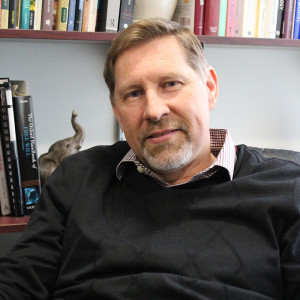
Would a good and all-powerful God allow evil to occur in the world? Is the existence of innocent suffering proof that a loving and omnipotent God does not exist? While these questions have been raised by philosophers and theologians for more than two millennia, contemporary thinkers continue to address these perennial questions, developing new lines of inquiry and producing surprisingly fresh arguments both for and against the compatibility of God and evil.
Associate Professor of Philosophy Daniel Speak lays out these contemporary arguments in his recent book, “The Problem of Evil” (Polity Press, 2014), a primer on the issue for students and scholars. The book also advances his own gentle but clear defense of theism.
“Evil is a genuine problem for robust religious belief,” says Speak. He goes on: “I take its existence to be the basis for the single most forceful intellectual objection to religion. One of the book’s goals, then, is to defend the claim that theistic commitment can be rational.” His central approach involves identifying flaws in the prevailing atheistic arguments, seeking to demonstrate that the existence of evil does not necessarily disprove the existence of God. Though the book discusses contemporary efforts at traditional theodicy, which seek to reconcile the existence of God and suffering in the world, Speak puts his emphasis on the more promising project of defense.
Speak admits, somewhat sheepishly, that this material is fun to teach. Students do not need much encouragement to begin caring about the main issues. He notes that his students consistently inspire him with their ideas. As a case in point, Speak recalls a recent graduate student term paper arguing that there is something awkward about hoping God doesn’t exist. “This bright student,” Speak explains, “noted that if God doesn’t exist, then all of the evil that does occur is ultimately going to go unredeemed. If you don’t hope God exists, you’re essentially hoping the universe is tragic. It’s an interesting argument.”
With innocent suffering in evidence in daily headlines—a continent-wide refugee crisis or a mass shooting, for some examples — Speak worries about minimizing evil by treating it too abstractly. “Can the problem of evil really be purely academic?” he wonders. “I’m interested not only in understanding the philosophical problem itself but also in how philosophy might help us learn to live with the striking reality of evil. On my view, and in keeping with the tradition stretching back to Plato and Aristotle, the philosopher aims not just to figure out how the world really is; the philosopher is also in the business of figuring out how to live a good human life. With the problem of evil, these two philosophical aims come profoundly together. I would be making mistake as a philosopher if my interest in this set of issues were purely theoretical.”



